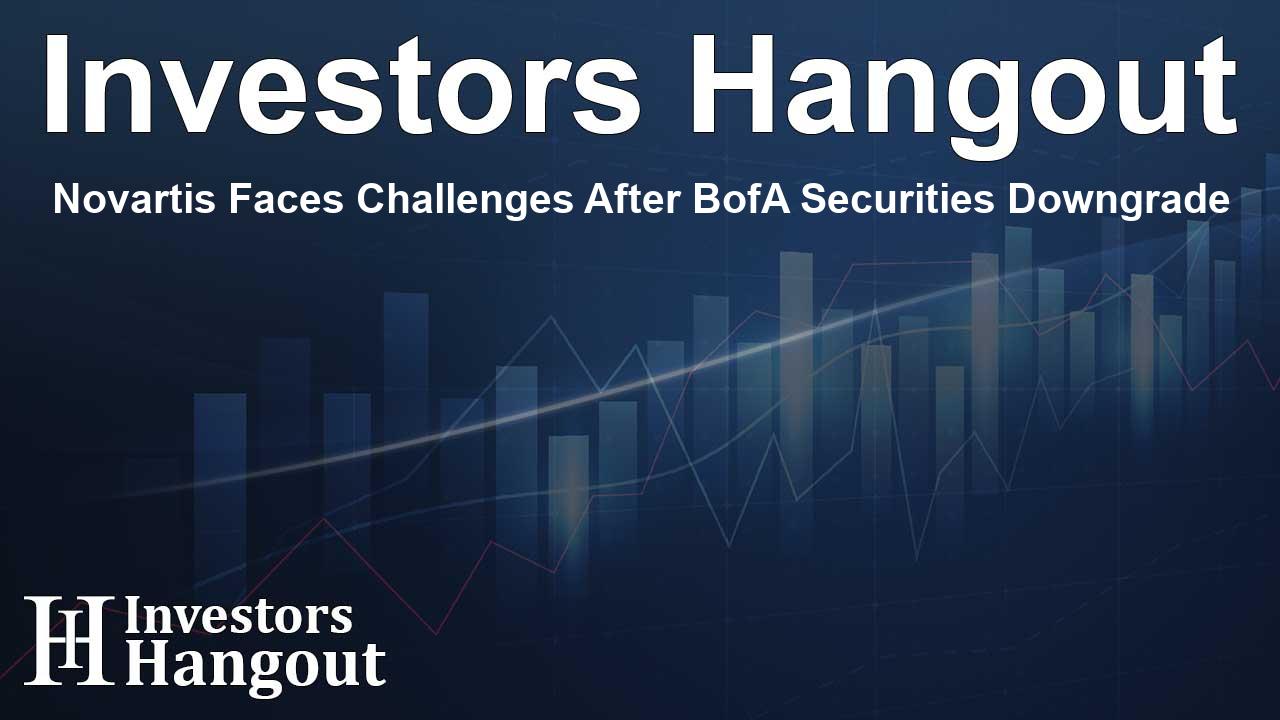Novartis Faces Challenges After BofA Securities Downgrade

Novartis Experiences Decline Following Downgrade by BofA Securities
Recently, shares of Novartis (SIX:NOVN) have seen a downward trend after a notable downgrade by BofA Securities. The esteemed financial firm has shifted Novartis' rating from 'buy' to 'neutral,' signaling a more cautious outlook on this robust pharmaceutical company.
As of the latest trading session, Novartis experienced a drop of 2.4%, settling at CHF 96.48. This adjustment comes amid concerns regarding a slower pathway to new catalysts, as well as uncertainties surrounding long-term growth and impending legal challenges.
Concerns Impacting Novartis' Performance
BofA's revised view includes a reduction in the price target for Novartis from CHF 120 to CHF 110, highlighting an increasing uneasiness about the company's immediate potential for market outperformance. This change in sentiment is particularly striking, given that Novartis' stock had previously outperformed the broader European pharmaceutical market by approximately 12% since the beginning of the year.
This solid performance was largely fueled by promising results from several Phase III clinical trials, which included products like Kisqali, Pluvicto, Iptacopan, and Scemblix. Additionally, the company had consistently reported earnings that surpassed market expectations.
Potential Risks Highlighted by BofA
Looking ahead, BofA has cited several risks that might prevent Novartis from maintaining momentum. A key item of concern is ongoing patent litigation related to Kisqali, a significant product in Novartis’ repertoire for treating breast cancer. The outcome of the lawsuit with MSN Labs over Kisqali's U.S. patent could have profound repercussions for the company's financial outlook.
Despite a relatively low probability of losing the patent, which stands at 20-25%, the potential impact could be severe, leading to an 18% reduction in projected earnings per share (EPS) by 2030, according to BofA estimates. Further, such a loss could trigger downgrades to consensus market estimates, further suppressing investor confidence.
The Challenge of Generic Competition
Novartis is also grappling with the impending introduction of generic competition for its leading heart failure medication, Entresto. BofA estimates that generic versions of the drug could enter the U.S. market by mid-2025, posing a significant threat to Novartis’ revenue stream.
Currently, BofA’s sales predictions for Entresto are already lower than market expectations; estimates show sales falling 8% short of consensus for 2025 and further declining by 13% for 2026. The potential loss of market share due to generics represents a substantial hurdle for Novartis in the near future.
Valuation Adjustments and Future Outlook
In addition to market competition and legal challenges, valuation concerns have also influenced BofA's decision to adjust Novartis' stock rating. The brokerage has revised its price-to-earnings (P/E) ratio estimate for Novartis from 16x down to 15.5x for the year 2025. This adjustment reflects a growing awareness of the impending patent expirations for key drugs, such as Cosentyx, Kesimpta, and Kisqali, which are all critical to the company’s sustained growth.
However, there is a light at the end of the tunnel for Novartis. While BofA has tempered its expectations for the years 2024 and 2025, it does predict a robust performance in 2028, expecting earnings to exceed consensus figures by 16%. This optimism is rooted in potential new product launches that could establish fresh growth avenues as the decade progresses.
In summary, although Novartis is currently facing a range of challenges, including a recent downgrade from BofA Securities, the long-term outlook may remain brighter, driven by anticipated innovations and product introductions.
Frequently Asked Questions
What caused the recent decline in Novartis shares?
The decline in Novartis shares was mainly triggered by a downgrade from BofA Securities, changing their rating from 'buy' to 'neutral,' indicating a more cautious stance on the company’s future performance.
What concerns are affecting Novartis' stock performance?
Concerns include patent litigation risks associated with Kisqali, the impending competition from generics for Entresto, and valuation adjustments due to numerous patent expirations.
How has Novartis performed recently compared to its peers?
Novartis had previously outperformed the European pharmaceutical sector by about 12% since the start of the year, thanks to positive outcomes from clinical trials and earnings that exceeded expectations.
What is BofA's revised price target for Novartis?
BofA has lowered its price target for Novartis from CHF 120 to CHF 110, reflecting greater uncertainty regarding the company’s near-term growth prospects.
What is the long-term outlook for Novartis?
Despite short-term challenges, BofA remains optimistic about Novartis' prospects over the longer term, forecasting a 16% increase in earnings above consensus in 2028, primarily due to new product launches.
About Investors Hangout
Investors Hangout is a leading online stock forum for financial discussion and learning, offering a wide range of free tools and resources. It draws in traders of all levels, who exchange market knowledge, investigate trading tactics, and keep an eye on industry developments in real time. Featuring financial articles, stock message boards, quotes, charts, company profiles, and live news updates. Through cooperative learning and a wealth of informational resources, it helps users from novices creating their first portfolios to experts honing their techniques. Join Investors Hangout today: https://investorshangout.com/
Disclaimer: The content of this article is solely for general informational purposes only; it does not represent legal, financial, or investment advice. Investors Hangout does not offer financial advice; the author is not a licensed financial advisor. Consult a qualified advisor before making any financial or investment decisions based on this article. The author's interpretation of publicly available data shapes the opinions presented here; as a result, they should not be taken as advice to purchase, sell, or hold any securities mentioned or any other investments. The author does not guarantee the accuracy, completeness, or timeliness of any material, providing it "as is." Information and market conditions may change; past performance is not indicative of future outcomes. If any of the material offered here is inaccurate, please contact us for corrections.